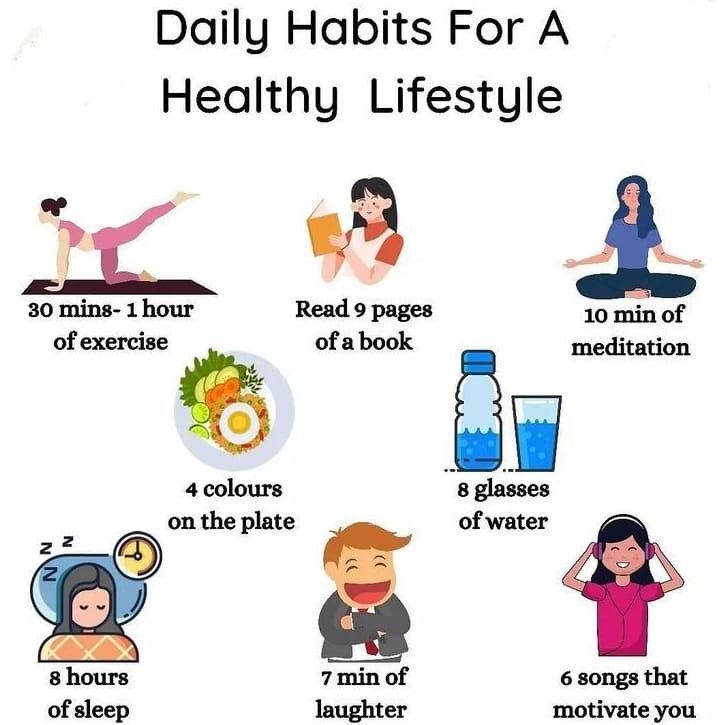Table of Contents
A Healthy Daily Routine: Small Habits for Lifelong Wellness
Health is not a destination—it’s a daily practice. In today’s fast-paced, high-stress world, prioritizing your well-being isn’t always easy, but it’s absolutely essential. A healthy daily routine doesn’t require radical life changes or expensive supplements. It’s about building small, sustainable habits that support your body and mind over time.
In this blog post, we’ll walk you through a holistic, health-focused daily routine—from sunrise to bedtime—that covers nutrition, movement, mental health, hydration, and more. This routine is adaptable, simple, and realistic enough to fit most lifestyles.

6:00 AM – Wake Up With Purpose
Your day begins the moment you wake up. Starting your morning with intention can set a positive tone for the hours ahead.
What to do:
- Avoid reaching for your phone right away.
- Take a few deep breaths or stretch in bed.
- Open your curtains or step outside for 5 minutes of sunlight to help regulate your circadian rhythm.
Why it matters: Exposure to morning light supports natural sleep-wake cycles and boosts serotonin production, helping you feel more alert and focused throughout the day.
6:30 AM – Hydrate and Move
After 7–8 hours of sleep, your body is dehydrated. Begin your day by drinking a full glass of water—add lemon for a gentle liver detox and vitamin C boost.
Follow with 15–30 minutes of movement, depending on your fitness level and time:
- A brisk walk, yoga, or stretching routine
- Bodyweight exercises like squats, push-ups, or jumping jacks
- A bike ride or light jog
Why it matters: Morning movement wakes up your muscles, improves circulation, reduces stiffness, and releases feel-good endorphins.
7:00 AM – Nourish Your Body With Breakfast
Fuel your body with a balanced breakfast that stabilizes blood sugar and provides long-lasting energy.
Healthy breakfast options:
- Scrambled eggs with spinach and avocado
- Oatmeal with berries, flaxseeds, and almond butter
- Smoothie with greens, banana, protein powder, and chia seeds
- Greek yogurt with nuts and fruit
Avoid: Sugary cereals, pastries, or skipping breakfast entirely. These can lead to mid-morning crashes or overeating later.
Why it matters: A nutritious breakfast supports brain function, metabolism, and digestive health.
8:00 AM – Focused Work and Hydration
Whether you’re working from home or heading to the office, this is the time to channel your energy into meaningful tasks. While you work, remember to hydrate.
Tips:
- Keep a reusable water bottle nearby.
- Aim for at least 2–3 liters of water a day, more if you’re active or live in a hot climate.
- Add cucumber, mint, or citrus slices to your water for flavor and nutrients.
Why it matters: Dehydration can cause fatigue, poor concentration, and headaches. Staying hydrated improves mental clarity and physical stamina.
10:30 AM – Healthy http://Healthy SnackSnack (Optional)
If you’re hungry, opt for a light, nutrient-dense snack to keep your energy steady
Good choices:
- A handful of almonds or walnuts
- Sliced apple with peanut butter
- Carrot sticks with hummus
- A boiled egg
Why it matters: Healthy snacks prevent energy dips and keep metabolism humming without the crash of sugary treats or processed foods.
12:30 PM – Mindful Lunch
Lunch should be satisfying but not heavy. Choose whole foods that give your body a mix of protein, fiber, and healthy fats.
Example lunch plate:
- Grilled chicken or tofu
- Mixed greens with olive oil and lemon
- Quinoa or brown rice
- Steamed veggies or roasted sweet potatoes
Mindful eating tip: Step away from your desk. Eat slowly. Chew thoroughly. Enjoy your food without screens or multitasking.
Why it matters: Digestion begins in the mouth. Mindful eating improves nutrient absorption and reduces bloating or overeating.
1:30 PM – Walk or Light Movement
A short walk after lunch helps digestion and fights afternoon fatigue. Even 10–15 minutes of walking outdoors can:
- Regulate blood sugar
- Boost energy and mood
- Prevent the post-lunch slump
If you can’t go outside, try light stretching or mobility work at your desk.
2:00 PM – Afternoon Productivity and Posture Check
Return to work with refreshed energy. Around this time, it’s common to start slouching or tensing up. Set a timer every hour to:
- Check your posture
- Roll your shoulders
- Take 10 deep belly breaths
- Stand or stretch briefly
Why it matters: Good posture and breathwork reduce muscle tension, eye strain, and mental fatigue.
3:30 PM – Healthy Snack (Optional)
If dinner is still a few hours away and you feel hungry, choose a healthy snack to support your blood sugar.
Try:
- A small smoothie
- Rice cakes with almond butter
- Cottage cheese with pineapple
- A protein bar with clean ingredients
Avoid energy drinks or sugary treats—they offer short-term stimulation followed by a crash.
5:30 PM – Physical Activity or Exercise
If you didn’t work out in the morning, now’s a great time for it. Choose a form of exercise that you enjoy so it feels like self-care, not punishment.
Great evening workouts:
- A gym session
- Cycling, swimming, or dance class
- Home HIIT or bodyweight routine
- Evening yoga or Pilates
Why it matters: Regular exercise reduces inflammation, strengthens your heart, regulates blood sugar, and supports emotional health.
6:30 PM – Healthy Dinner and Connection
Dinner should be nourishing but light enough to not interfere with sleep. Focus on:
- Lean proteins like fish, beans, or turkey
- Non-starchy vegetables (broccoli, kale, carrots)
- A small portion of complex carbs (quinoa, lentils)
Try to avoid heavy fried foods, excess sugar, and overeating late at night.
Bonus: Make dinner a tech-free time for meaningful conversations with family or friends. Social connection is vital for mental and emotional well-being.
7:30 PM – Digital Detox and Wind-Down
Begin transitioning your body into a restful state.
Ideas:
- Dim the lights
- Put away work and avoid stimulating media
- Read a book, do a puzzle, or journal
- Take a warm shower or bath with Epsom salts
This signals your nervous system to shift from “fight or flight” to “rest and digest.”
9:00 PM – Evening Routine and Sleep Prep
Sleep is the cornerstone of health. Prioritize getting at least 7–8 hours of high-quality sleep by creating a relaxing bedtime ritual.
Healthy evening habits:
- Herbal tea (e.g., chamomile or lemon balm)
- Light stretching or yoga nidra
- Gratitude journaling
- Listening to calm music or a sleep meditation
Sleep hygiene tips:
- Keep your room cool (65–68°F or 18–20°C)
- Use blackout curtains or an eye mask
- Avoid caffeine after 2 PM
- Turn off screens at least 30–60 minutes before bed
10:00 PM – Sleep
Let your body recharge. Sleep supports:
- Cellular repair
- Brain detoxification
- Hormone balance
- Memory consolidation
- Immune function
Without sleep, all other health efforts—diet, exercise, hydration—are compromised. It’s the foundation of long-term well-being.
Final Thoughts
A healthy daily routine is less about rigid rules and more about rhythm and repetition. You don’t need to be perfect—just consistent. Start with small changes, listen to your body, and give yourself grace on the off days.
Remember: every action you take is a vote for the kind of life you want to lead.
Choose habits that nourish you—body, mind, and soul—and health
